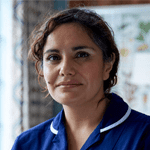You are now in the ninth and final month of your pregnancy – with only a few weeks left of this pregnancy.
Reaching this milestone can be a bit of a shock and overwhelming – which is understandable, but also remember how far you have come, how much your baby has grown and how you have both been developing too.
It’s not uncommon in the third trimester of your pregnancy to find your appetite changing too – you will find it hard to eat 3 meals a day as your growing bump will mean that your stomach is squished up and you get full easily. But then you also get hungry quickly too! – this is due to the increased energy needs of your body and not being able to eat as much per meal.
If you are active and well generally you will need around 200 extra calories in the third trimester due to these extra energy needs – however before you plan a huge food shop or take away order, bear in mind that 200 extra calories in food terms is:
- 2 slices of wholemeal toast and margarine
- 2 digestive biscuits
- A banana and some plain yoghurt
It’s important to remember you are not eating for two – at any stage in your pregnancy. Try and stick to healthy options that will keep you feeling fuller for longer too – so avoid using up the 200 calories on crisps and biscuits.
You’ll also find breaking your meals up into 5-6 smaller meals a day might work better for you at this stage instead of 3 big meals a day. Again, the aim is to be as healthy as possible so you get the extra energy needs at this stage in your pregnancy.
How big is my baby at 36 weeks?
At nine months your baby is now measuring just under 48 centimetres from top to bottom in length and weighing just over 2.5 kilograms, roughly about the size of romaine lettuce.
What happens in week 36 of pregnancy?
At 36 weeks it’s all systems go for your baby in getting ready for birth. Your baby’s lungs are now developed and ready to go for that first breath your baby will take once they are born – until then their lungs will remain deflated as all of baby’s oxygen needs are being met through the placenta.
By around nine months your baby’s hearing will also take a huge leap in sensitivity. Baby’s nervous system and brain are quickly maturing to be ready for the big wide world.
36 pregnancy symptoms
Engagement/lightening – This is the term used to refer to when your baby’s head moves further into your pelvis in readiness for labour. Whilst when this happens it can vary from person to person, if this is your first baby, your baby will usually engage around 36 weeks. If you’ve had a baby before, it’s not uncommon for engagement to happen just before labour starts.
You will probably notice this change by experiencing something called lightening as when your baby starts to move further into your pelvis, you’ll find that the pressure from the top of the bump is a little less and your lungs have some extra room to expand. You may even find that any heartburn you are experiencing is relieved a little too. However, you will also notice that a baby much lower down now starts to put on your bladder, leading to more frequent toilet visits and that you are now “waddling” more when you walk.
If your baby has engaged before 36 weeks it’s not a cause for concern at all. It doesn’t mean that you’ll give birth prematurely, just that your baby is keen to get in place and ready for birth!
Week 36 pregnancy tips
- By now your hospital bag should be packed, checked and re-packed again. Ideally you want it by the front door or in your car ready for when you are on your way to have your baby. This will help you feel better prepared and cause less of a panic or stress when you are in the moment.
- If you are planning on having your baby in a birth centre visit, you should ideally have a visit with midwives who work there at 36 weeks. This is to check to ensure the birth centre is the best and safest option for you to plan to give birth in and discuss what this means for you. The same applies if you are planning on having a home-birth – your midwives should be visiting you at home at around 36 weeks to discuss your birth plan, ensure they know where to come and just check that all you need for birth is there.
- Carve out some time for yourself too – gentle exercise, yoga, deep breathing exercises can all help you feel calmer and better prepared for the weeks ahead. It can also help with sleep and being rested.
Pregnancy Week by Week
1 Week Pregnant
2 Weeks Pregnant
3 Weeks Pregnant
4 Weeks Pregnant
5 Weeks Pregnant
6 Weeks Pregnant
7 Weeks Pregnant
8 Weeks Pregnant
9 Weeks Pregnant
10 Weeks Pregnant
11 Weeks Pregnant
12 Weeks Pregnant
13 Weeks Pregnant
14 Weeks Pregnant
15 Weeks Pregnant
16 Weeks Pregnant
17 Weeks Pregnant
18 Weeks Pregnant
19 Weeks Pregnant
20 Weeks Pregnant
21 Weeks Pregnant
22 Weeks Pregnant
23 Weeks Pregnant
24 Weeks Pregnant
25 Weeks Pregnant
26 Weeks Pregnant
27 Weeks Pregnant
28 Weeks Pregnant
29 Weeks Pregnant
30 Weeks Pregnant
31 Weeks Pregnant
32 Weeks Pregnant
33 Weeks Pregnant
34 Weeks Pregnant
35 Weeks Pregnant
36 Weeks Pregnant
37 Weeks Pregnant
38 Weeks Pregnant
39 Weeks Pregnant
40 Weeks Pregnant
41 Weeks Pregnant

